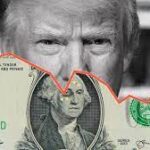Financial markets are no strangers to volatility. Aggressive trade wars, government shutdowns, and unexpected global events can send stocks tumbling in an instant. While short-term losses can rattle investors, history suggests these events often present opportunities—especially for those with a long-term outlook.
The key to understanding market reactions lies in behavioral finance, particularly the concept of recency bias—where investors tend to overemphasize recent events. Just as in sports rankings, where recently active players dominate “best of all time” lists, investors chase stocks making headlines while ignoring underlying fundamentals.
This tendency leads to overreactions—whether excessive buying during optimism or panic-driven selling during downturns. Contrarian investors recognize these patterns, often moving against the trend: selling when stocks are overvalued and buying when fear drives prices lower.
Trade Wars: A Market Disruptor or Buying Opportunity?
History has shown that tariffs and trade wars create short-term volatility but do not necessarily dictate long-term outcomes.
- Case Study: The 2002 Steel Tariffs
President George W. Bush imposed tariffs on imported steel to protect domestic producers. While they provided a brief boost, the long-term effects were minimal, if not negative, as the industry continued its decline. - Case Study: The 2018 Solar Tariffs
The Trump administration’s tariffs on imported solar cells initially hurt companies like SolarEdge Technologies and SunPower, which relied on foreign-made panels. However, firms with domestic production, such as First Solar, thrived.
The lesson? Not all industries react the same way to tariffs—some suffer, while others benefit. Investors who analyze these dynamics can identify hidden opportunities.
The Best Strategy During Market Volatility
Market selloffs often create buying windows for long-term investors. However, careful stock selection is crucial. Instead of attempting to time the market, financial experts suggest:
✅ Building a watchlist of quality stocks with clear buy targets.
✅ Looking beyond immediate headlines to assess long-term industry trends.
✅ Considering industries that benefit from trade policies, rather than those directly impacted.
For example, when tariffs disrupted solar imports in 2018, energy storage companies, AI-driven supply chain software firms, and domestic panel manufacturers benefited. Similarly, semiconductor stocks like NVIDIA (NVDA), Advanced Micro Devices (AMD), and Taiwan Semiconductor (TSMC) remain crucial amid global supply chain shifts.
Looking Ahead: What Could Trigger the Next Market Swing?
While no one can predict market movements with certainty, several key events loom on the horizon:
📌 Potential tariff escalations in early-to-mid March, as previous postponements expire.
📌 The U.S. budget resolution deadline by mid-March, which could result in a government shutdown.
📌 Geopolitical tensions and global economic slowdowns, adding to market uncertainty.
Final Takeaway
Market volatility driven by trade wars and political uncertainty is inevitable. While such events create short-term disruption, they also present strategic opportunities for those who take a disciplined, long-term approach. Investors should carefully analyze how policies impact different industries and make informed decisions rather than reacting emotionally to market swings.
Disclosure: This article does not represent investment advice. The content and materials featured on this page are for educational purposes only.
Source: Forbes
Related:
The Market Begins a New Trading Trend: Contrarian Trump Trades
Hedge Funds Loaded Up AI Stocks at the Fastest Pace Since 2021
These Stocks Could Skyrocket According to “Trends With No Friends” Strategy!
Market Looks Strong—But Whales Are Quietly Exiting, Should You?
Bank of America Sees an ‘Attractive Entry Point’ in These 2 Stocks
Wall Street’s latest favorites – Hedge Funds’ Top Picks in Q4
This Week S&P500 ChartStorm – Bad News Damages Investor Sentiment
Warren Buffett Berkshire now hold a record $334 BILLION in cash, What does he know that we don’t?
Key Earnings Takeaways from This Week: AI, E-Commerce, and Travel Stocks Lead Market
Will Elon Musk Enter Quantum Computing? Here’s Why It Might Happen in 2025
Intel Turbulent Week: Breakup Rumors, Strategic Deals, and What It Means for $INTC Stock
Nvidia CEO Jensen Huang directly addresses DeepSeek stock sell-off, saying investors got it wrong
Gold market cap hit $20 TRILLION for first time in history. Why are people still piling into gold?
Analysis: Is Kelsier’s $200MM insider trading scandal the next FTX?
How Dirty Money From Fentanyl Sales Is Flowing Through China










